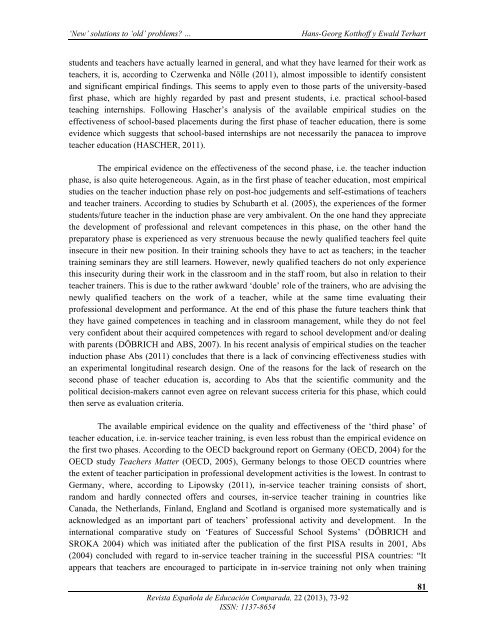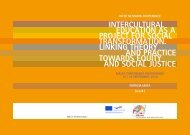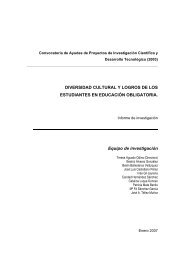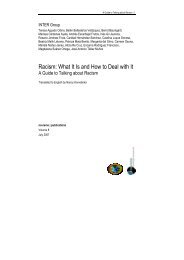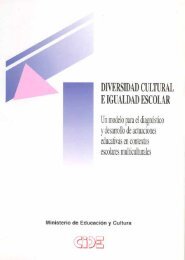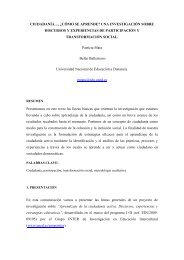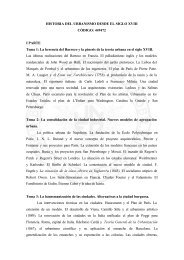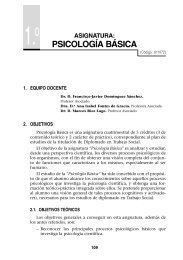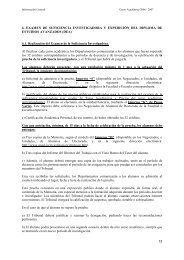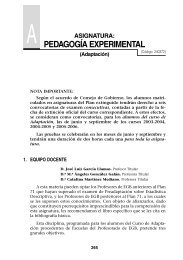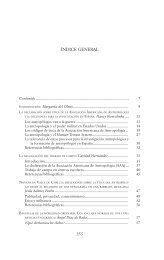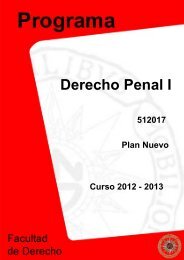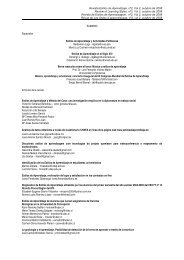'NEW' SOLUTIONS TO 'OLD' PROBLEMS? RECENT ... - UNED
'NEW' SOLUTIONS TO 'OLD' PROBLEMS? RECENT ... - UNED
'NEW' SOLUTIONS TO 'OLD' PROBLEMS? RECENT ... - UNED
Create successful ePaper yourself
Turn your PDF publications into a flip-book with our unique Google optimized e-Paper software.
‘New’ solutions to ‘old’ problems? …<br />
Hans-Georg Kotthoff y Ewald Terhart<br />
students and teachers have actually learned in general, and what they have learned for their work as<br />
teachers, it is, according to Czerwenka and Nölle (2011), almost impossible to identify consistent<br />
and significant empirical findings. This seems to apply even to those parts of the university-based<br />
first phase, which are highly regarded by past and present students, i.e. practical school-based<br />
teaching internships. Following Hascher’s analysis of the available empirical studies on the<br />
effectiveness of school-based placements during the first phase of teacher education, there is some<br />
evidence which suggests that school-based internships are not necessarily the panacea to improve<br />
teacher education (HASCHER, 2011).<br />
The empirical evidence on the effectiveness of the second phase, i.e. the teacher induction<br />
phase, is also quite heterogeneous. Again, as in the first phase of teacher education, most empirical<br />
studies on the teacher induction phase rely on post-hoc judgements and self-estimations of teachers<br />
and teacher trainers. According to studies by Schubarth et al. (2005), the experiences of the former<br />
students/future teacher in the induction phase are very ambivalent. On the one hand they appreciate<br />
the development of professional and relevant competences in this phase, on the other hand the<br />
preparatory phase is experienced as very strenuous because the newly qualified teachers feel quite<br />
insecure in their new position. In their training schools they have to act as teachers; in the teacher<br />
training seminars they are still learners. However, newly qualified teachers do not only experience<br />
this insecurity during their work in the classroom and in the staff room, but also in relation to their<br />
teacher trainers. This is due to the rather awkward ‘double’ role of the trainers, who are advising the<br />
newly qualified teachers on the work of a teacher, while at the same time evaluating their<br />
professional development and performance. At the end of this phase the future teachers think that<br />
they have gained competences in teaching and in classroom management, while they do not feel<br />
very confident about their acquired competences with regard to school development and/or dealing<br />
with parents (DÖBRICH and ABS, 2007). In his recent analysis of empirical studies on the teacher<br />
induction phase Abs (2011) concludes that there is a lack of convincing effectiveness studies with<br />
an experimental longitudinal research design. One of the reasons for the lack of research on the<br />
second phase of teacher education is, according to Abs that the scientific community and the<br />
political decision-makers cannot even agree on relevant success criteria for this phase, which could<br />
then serve as evaluation criteria.<br />
The available empirical evidence on the quality and effectiveness of the ‘third phase’ of<br />
teacher education, i.e. in-service teacher training, is even less robust than the empirical evidence on<br />
the first two phases. According to the OECD background report on Germany (OECD, 2004) for the<br />
OECD study Teachers Matter (OECD, 2005), Germany belongs to those OECD countries where<br />
the extent of teacher participation in professional development activities is the lowest. In contrast to<br />
Germany, where, according to Lipowsky (2011), in-service teacher training consists of short,<br />
random and hardly connected offers and courses, in-service teacher training in countries like<br />
Canada, the Netherlands, Finland, England and Scotland is organised more systematically and is<br />
acknowledged as an important part of teachers’ professional activity and development. In the<br />
international comparative study on ‘Features of Successful School Systems’ (DÖBRICH and<br />
SROKA 2004) which was initiated after the publication of the first PISA results in 2001, Abs<br />
(2004) concluded with regard to in-service teacher training in the successful PISA countries: “It<br />
appears that teachers are encouraged to participate in in-service training not only when training<br />
Revista Española de Educación Comparada, 22 (2013), 73-92<br />
ISSN: 1137-8654<br />
81


